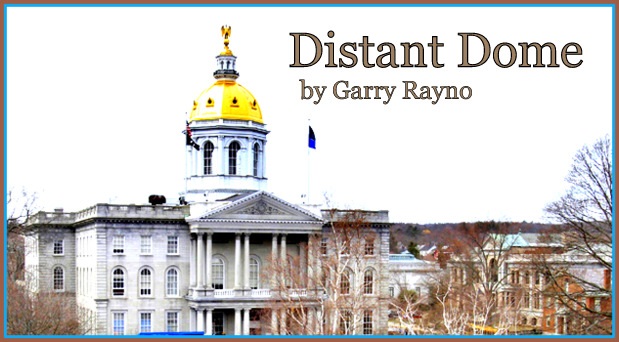Distant Dome is co-published by Manchester Ink Link and InDepthNH.org
By GARRY RAYNO, Distant Dome
CONCORD – During the next five weeks, state residents will be able to express their concerns to the state politicians seeking their votes.
Numerous candidate and issue forums will be held, and the news media will seek voter input for questions and issues they want raised during candidate debates or interviews: All opportunities to question candidates on issues important to the state and to families.

Garry Rayno
Now is your time if you want to change the direction of the state or if you want to maintain the status quo. Once the politicians arrive in Concord, don’t let them forget the promises they made or the stands they took.
Concern about the state’s on-going opioid drug epidemic has risen to the top of the list while jobs and the economy have taken a back seat along with education.
While the broader topics may resonate with the poll participants, other related issues may be more telling of what the state needs to tackle in the next two-year legislative session.
For example, the state has spent a great deal of money from state and federal sources to combat the opioid crisis that several years ago received scant attention in the polls.
When lawmakers decide they have to do something, they tend to throw money at the problem and that is what happened with the drug crisis.
Money was given to newly formed treatment and recovery programs that have now been accused of poor bookkeeping if not outright graft.
The state has been slow to evaluate the outcomes of these drug treatment and recovery programs and scrutinize the companies seeking to provide the services.
The crisis is real and more than one person a day is dying from an overdose, which has ripped apart the fabric of many families and communities.
But if all that money devoted to helping the addicts and their families, friends and employers is not being used effectively, what good is that for the substance abuser.
State residents ought to be asking the office seekers how they intend to approach the drug crisis and what they believe should be done to establish accountability.
Health Care
According to the most recent Granite State Poll, individuals say the top problem they and their families face is health care and its costs. A quarter of the people surveyed said that is their chief concern.
Health care and health insurance costs are high in New Hampshire and lawmakers have tried to rein some of those expenditures the past few years, but the upward trend continues.
What do the politicians propose to do to improve access to quality and affordable care?
About six or seven years ago, lawmakers ended the Certificate of Need Board which sought to avoid duplicated specialty services from hospital to hospital.
Do candidates believe some kind of overall licensing medical board is needed again to help contain costs?
Medicaid expansion also is important to address both the drug crisis and containing medical costs, but it is in very precarious position as the Trump administration has used executive orders to disrupt and threaten the program too popular for a GOP controlled Congress to repeal it.
School Funding
For many years after the Supreme Court’s Claremont education decisions, education and education funding topped the list of most important issues facing the state. It fell to second place during the Great Recession that began a decade ago when jobs and the economy became the chief concern and now the drug crisis is.
But a recent study by the now defunct NH Center for Public Policy Studies showed that the disparities between property rich and property poor towns are growing and near or above what they were when the court ruled the system unconstitutional.
A legislative study committee is working on changes to the distribution formula. But more immediately, other communities want to block the elimination of stabilization grants established to soften the blow of the most recent change in the funding formula.
Gradually eliminating the grants is significantly upping the property tax rates in poor school districts.
Recent attempts to allow state money to be used for private schools or home schooling will be revisited and candidates need to tell their constituents where they stand on the issue.
Where a candidate stands on those issues are questions voters need to ask.
Taxes
Taxes used to be the chief concern of state residents but they have fallen way down the list, according to the latest Granite State Poll done by the University of New Hampshire’s Survey Center.
That is either because no one thinks any real change is possible or they like the “New Hampshire advantage” of no income or sales tax.
The most significant changes to taxes in recent years have reduced the rates for the two businesses taxes — the business profits and business enterprise taxes — and increased the deductions and exemptions.
There are a lot of tax issues to explore such as reinstating a higher statewide property tax for education, the current use program — more than half of the land area of the state enrolled in the program — has shifted the tax burden from large land owners to residential and business property owners, and business tax credits.
New Hampshire continues using an essentially 1800s tax system based on land wealth to raise the lion’s share of money to fund local and county government in New Hampshire.
Human Service Programs
Although several bills have passed recently to reform the Division for Children, Youth and Families, problems remain as they do with the developmentally disabled wait list for services although lawmakers have tried unsuccessfully for many years to whittle the list down.
For years the state has been housing mentally ill patients deemed to be a harm to themselves or others in the Secure Psychiatric Unit in the state prison.
That public policy has been argued in the press this year and will continue to be discussed for years to come.
Other Concerns
Lawmakers recently decriminalized simple possession of marijuana and hashish but have failed to legalize pot as other New England states have done.
Another issue that is bound to be decided in the coming two years is whether lawmakers want to curtail utility regulators deciding large utility projects like Northern Pass and if subsidies for wood burning power plants and large solar displays should continue.
There is no shortage of issues to ask candidates, but insist they answer your questions and don’t change the subject, which they like to do these days.
Ask the questions that matter to you. Record the politicians’ answers and remind them what they said when the issue is raised in the Legislature.
That is how democracy works.
Garry Rayno may be reached at garry.rayno@yahoo.com
Distant Dome by veteran journalist Garry Rayno explores a broader perspective on the State House and state happenings. Over his three-decade career, Rayno covered the NH State House for the New Hampshire Union Leader and Foster’s Daily Democrat. During his career, his coverage spanned the news spectrum, from local planning, school and select boards, to national issues such as electric industry deregulation and Presidential primaries. Rayno lives with his wife Carolyn in New London.





